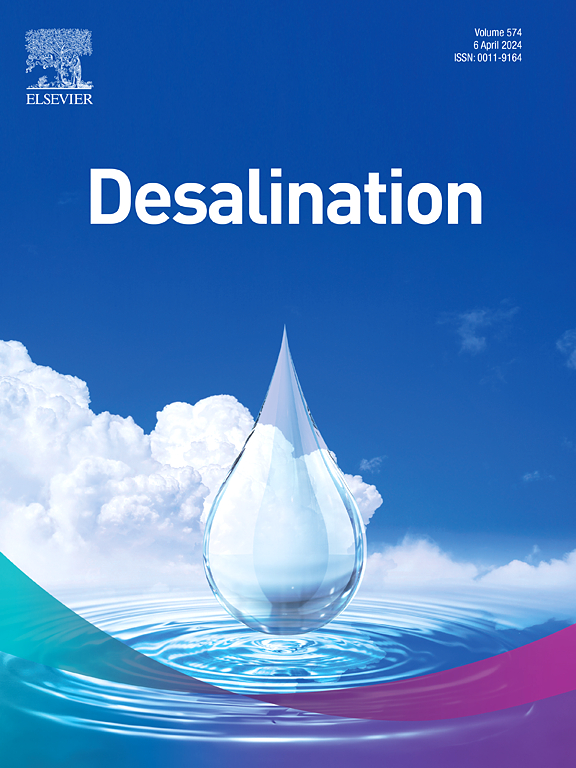动态工况下由海流涡轮驱动的反渗透海水淡化系统
IF 9.8
1区 工程技术
Q1 ENGINEERING, CHEMICAL
引用次数: 0
摘要
淡水短缺是偏远沿海和岛屿地区面临的严峻挑战,在这些地区获得传统淡水资源的机会有限。反渗透(RO)海水淡化已被证明是一种有效的解决方案;然而,中国的高能耗和对化石燃料的依赖需要可持续的替代品。本研究开发了一种海流涡轮驱动的海水淡化系统,旨在解决海流的动态条件,提高系统效率。该系统采用直接驱动机制,最大限度地减少能量损失,并设计了Clark泵,解决了在波动功率输入条件下提高海水淡化系统能效的关键问题。此外,还开发了反渗透膜的软启动工艺,确保了反渗透膜的长期稳定运行,解决了反渗透膜在波动功率输入下的可靠性问题。根据运行参数和水质要求,建立了安全运行窗口,制定了恒定回收率和低比能耗的运行策略,确保系统在变海流流速下稳定运行。试验表明,系统比能耗为3.61 kWh/m3,能量回收装置的能量回收效率为83.7%。此外,在反渗透膜软启动过程中,进料流量和稳压时间均超过30s,有效降低了液压冲击造成的潜在损坏风险。本文章由计算机程序翻译,如有差异,请以英文原文为准。
The reverse osmosis desalination system driven by the marine current turbine under dynamic conditions
Freshwater scarcity is a critical challenge in remote coastal and island regions, where access to traditional freshwater resources is limited. Reverse osmosis (RO) desalination has proven to be an effective solution; however, its high energy consumption and reliance on fossil fuels necessitate sustainable alternatives. This study develops a marine current turbine-driven desalination system designed to address the dynamic conditions of marine currents and enhance system efficiency. The proposed system adopts a direct-drive mechanism to minimize energy losses and features the design of a Clark pump, addressing the key issue of improving energy efficiency in desalination systems under fluctuating power input conditions. Additionally, a soft start process for the RO membranes has been developed, ensuring the long-term stable operation of the membranes and resolving the reliability issues of RO membranes under fluctuating power inputs. Based on operational parameters and water quality requirements, a safe operating window has been established, and a constant recovery rate and low specific energy consumption operation strategy have been developed to ensure the stable operation of the system under varying marine current velocities. Trial testing demonstrated that the system's specific energy consumption is 3.61 kWh/m3, with an energy recovery efficiency of 83.7 % for the energy recovery device. Furthermore, during the soft-start process of the RO membranes, both the feed flowrate and pressure stabilization time exceed 30 s, effectively reducing the risk of potential damage caused by hydraulic shock.
求助全文
通过发布文献求助,成功后即可免费获取论文全文。
去求助
来源期刊

Desalination
工程技术-工程:化工
CiteScore
14.60
自引率
20.20%
发文量
619
审稿时长
41 days
期刊介绍:
Desalination is a scholarly journal that focuses on the field of desalination materials, processes, and associated technologies. It encompasses a wide range of disciplines and aims to publish exceptional papers in this area.
The journal invites submissions that explicitly revolve around water desalting and its applications to various sources such as seawater, groundwater, and wastewater. It particularly encourages research on diverse desalination methods including thermal, membrane, sorption, and hybrid processes.
By providing a platform for innovative studies, Desalination aims to advance the understanding and development of desalination technologies, promoting sustainable solutions for water scarcity challenges.
 求助内容:
求助内容: 应助结果提醒方式:
应助结果提醒方式:


